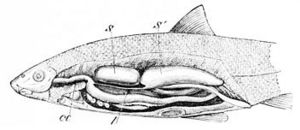Swim bladder facts for kids

The swim bladder is a special organ inside many fish. It's like a small balloon filled with gas. This organ helps fish control how deep they are in the water. It's also called a gas bladder or air bladder.
Most fish with bones, called bony fish, have a swim bladder. But fish with cartilage instead of bones, like sharks and rays (called cartilaginous fish), do not have one.
Contents
What Does a Swim Bladder Do?
The main job of the swim bladder is to help fish float. It lets them stay at a certain depth in the water without needing to swim hard. This saves a lot of energy.
Staying Stable
The swim bladder is usually located near the top of the fish's body. This position helps the fish stay balanced. It's like how a boat needs its heaviest part low down to keep from tipping over. The swim bladder helps the fish stay upright and stable in the water.
Making and Hearing Sounds
The swim bladder can also act like a drum or a speaker. Some fish use it to make sounds. They might do this to talk to other fish or to warn them. Other fish can use their swim bladder to hear sounds from around them. It helps them pick up vibrations in the water.
Swim Bladders and Lungs
Swim bladders are very similar to the lungs that humans and other land animals have. Scientists believe they both came from the same kind of organ a long, long time ago.
The first versions of these organs were simple sacs connected to the gut. They helped early fish breathe air when there wasn't much oxygen in the water. Over time, some of these sacs evolved into the lungs of animals that live on land. Others evolved into the swim bladders we see in many ray-finned fishes today. Some fish, like lungfish, still have lungs that work a lot like ours.
See also
- Buoyancy
- Fish anatomy
 In Spanish: Vejiga natatoria para niños
In Spanish: Vejiga natatoria para niños
 | Madam C. J. Walker |
 | Janet Emerson Bashen |
 | Annie Turnbo Malone |
 | Maggie L. Walker |


